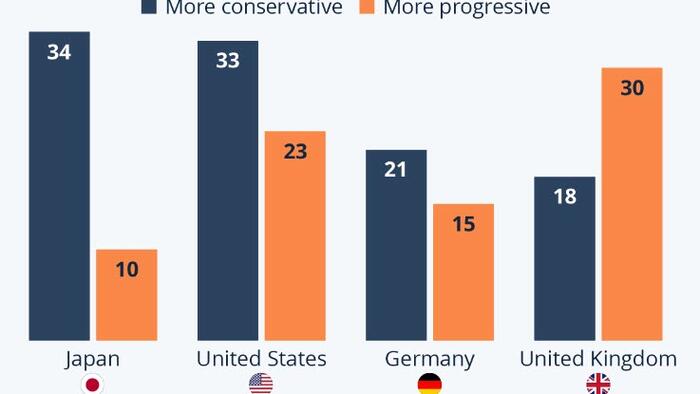With the election of Donald Trump as U.S. president, the American political landscape has notably shifted to the right, indicating a broader trend of increasing conservatism among the electorate. Preceding the election, numerous surveys suggested a strong tendency for U.S. voters to lean more conservatively compared to previous elections. Reports by Statista reveal that by July of that year, approximately one-third of American respondents reported a personal shift towards conservative views. Conversely, only 23 percent identified themselves as becoming more progressive, while the remaining 44 percent indicated either no change in their values or expressed uncertainty about their political identity. This phenomenon underscores a significant ideological shift occurring within the U.S. electorate, which may have long-term implications for the country’s political dynamics.
In comparison to the United States, conservative sentiments are also discernible in other countries. In Germany, a survey found that 21 percent of participants identified with a more conservative outlook, in contrast to just 15 percent who felt increasingly progressive. However, a larger proportion of the German respondents felt no substantial shift in their political beliefs, suggesting a prevailing centrism. This divergence highlights that while political polarization is apparent, the effects and manifestations of such shifts vary from one country to another. The data implies that within Germany, there is a more substantial centrist population, contrasting with the sharper ideological divisions observed in U.S. politics.
Japan’s political climate reveals a similar trend, where a considerable 34 percent of respondents acknowledged a growing inclination towards conservative views, while only 10 percent felt a progressive shift. This pattern illustrates that the rightward movement is not isolated to American politics but is a broader global trend, as various nations grapple with their political identities in a rapidly changing world. The trend of increasing conservatism, particularly among traditionally moderate populations, raises interesting questions about the factors driving these shifts. These could include economic challenges, growing nationalism, and reactions to social policies, which all contribute to a reevaluation of political beliefs among voters.
On the other hand, the United Kingdom presents a contrasting picture. Here, the political landscape has recently displayed a leftward trend, exemplified by the Labor Party’s ability to secure a clear majority in the latest general elections. This swing can be attributed to a surge in public dissatisfaction with the Conservative Party, which faced criticism due to its controversial government decisions and recent leadership crises. This frustration manifested in voters choosing to back a more progressive agenda, indicating a momentary reversal of the broader conservative trend seen in the U.S. and other countries. The political climate in the U.K. suggests that while conservatism has significant traction globally, there are moments when progressive forces can gain prominence, especially in light of specific national circumstances.
Further examination of the data reveals that the political distribution in the U.K. mirrors that of Germany, both exhibiting a significant centrist population. However, a noteworthy distinction emerges, as Germany’s political landscape features a more pronounced far-right presence. This suggests that while both countries grapple with ideological divisions, Germany might be experiencing a unique push toward the far-right that contrasts with the increasing leftward shift observed in the U.K. The future of political alignments in both nations remains uncertain, yet ongoing electoral results and public sentiment will be pivotal in shaping the trajectories of their respective political landscapes.
In summary, the current political climate across the world illustrates a complex interplay of conservative and progressive movements. The election of Donald Trump has facilitated a shift towards conservatism in the U.S., echoing trends in Japan and Germany, albeit with notable differences in intensity and expression. Meanwhile, the U.K.’s recent political developments highlight the potential for leftist movements to gain traction, reflecting the dynamic nature of political ideologies on a global scale. As nations navigate their internal and external challenges, the evolution of political beliefs will likely continue to impact electoral outcomes and policy directions in the years to come. This moment signifies a critical juncture for international political dynamics as varying sentiments towards conservatism and progressivism reshape the dialogue around governance and civic engagement.

